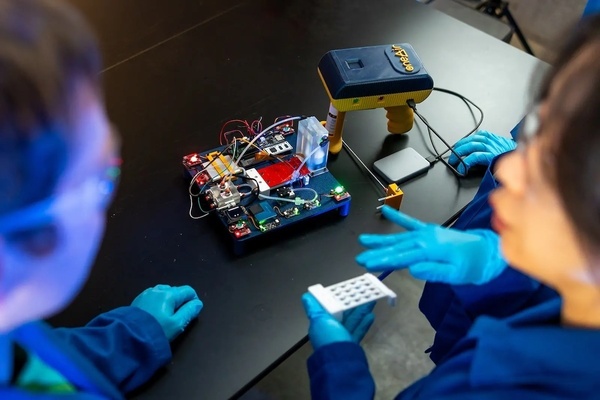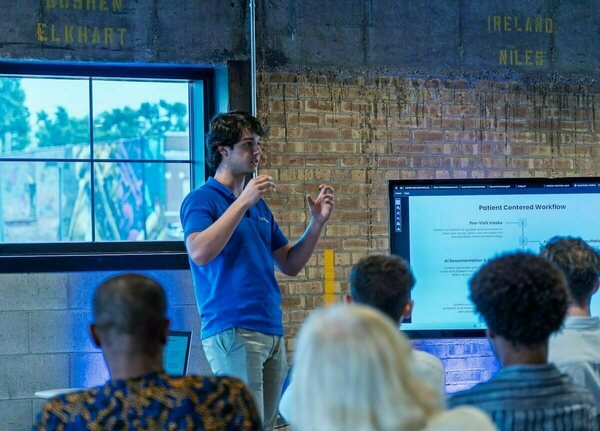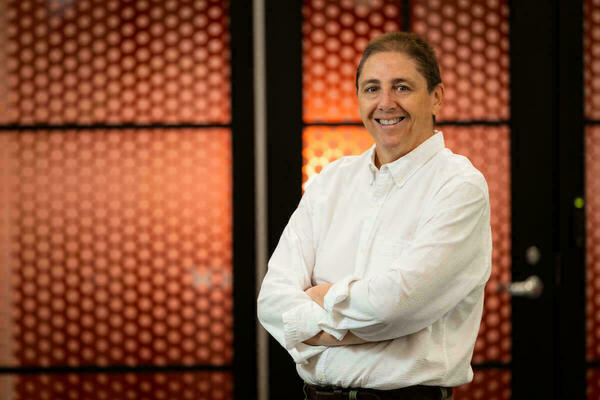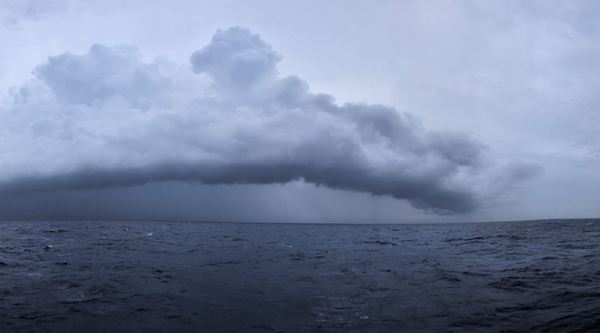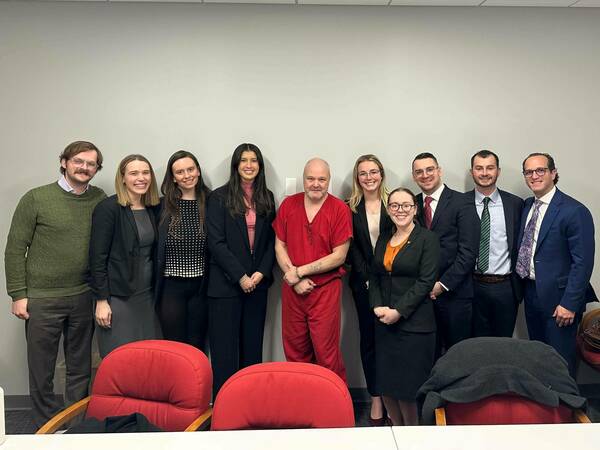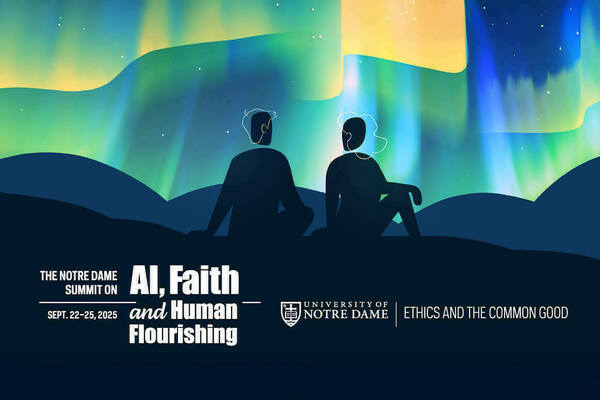Notre Dame’s faculty Fulbright U.S. Scholars advance research, connect with collaborators to address the world’s most pressing challenges
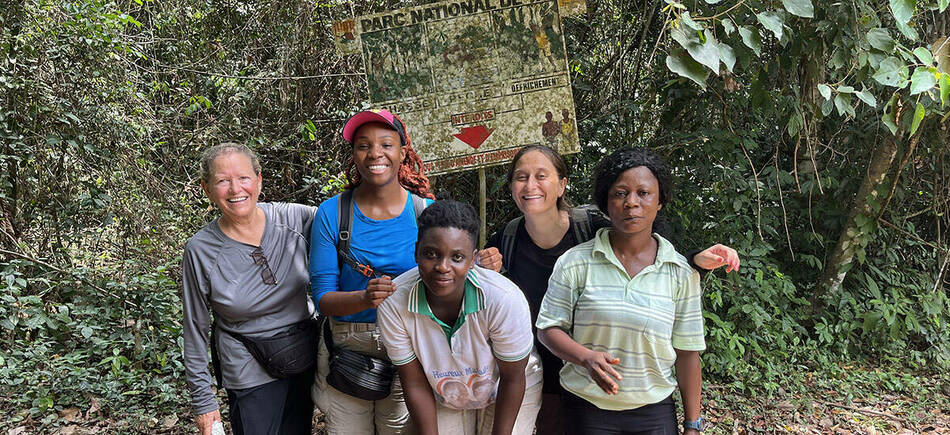 Notre Dame US Fulbright Scholar Jaimie Bleck (Political Science, second from the right) is joined by a colleague and family at Tai Forests in Côte d’ Ivoire
Notre Dame US Fulbright Scholar Jaimie Bleck (Political Science, second from the right) is joined by a colleague and family at Tai Forests in Côte d’ Ivoire“From Heavens to Earth, the Little Nucleus Reigns Supreme,” was the title of the talk Umesh Garg, professor in the Department of Physics and Astronomy, delivered last February 15th at Bethune College in Kolkata, India.
Garg, a nuclear physicist and Jaimie Bleck, associate professor of political science who studies African politics with a focus on democratization and participation, were the two Notre Dame faculty members awarded Fulbright U.S. Scholar Awards for the last academic year.
The Fulbright Program is the U.S. State Department’s flagship international educational exchange program, designed to promote understanding between the people of the United States and of other countries.
While Garg certainly inspired the audience that day with a lecture that began with the origins of the universe, moved on to the formation of stars, and concluded with the role nuclear physics plays in the world today, the primary purpose of his talk was to encourage students in an array of academic disciplines to choose a career grounded in pure research.
“In India, as in the U.S., students are often counseled to go into law, medicine, computer science, or engineering. My lecture on the creation of the universe presents the idea that an alternative path—pure research—is possible. I want students to know that research is not only intellectually fascinating and personally rewarding, but it is the mechanism that advances society as a whole," says Garg.
It was a talk that Garg gave, with variations, 25 times at 20 institutions—throughout the five-month term of his Fulbright award. And at all those talks, including the one at Bethune College, established in 1879 as the first women’s college in Asia, students approached him afterwards to discover more about his research and, essentially, to discover how they might, too, one day become a scientist.
In fact, Garg recounts, “I acted informally as a recruiter for Notre Dame and its Graduate School.”
Garg undertook his ambitious lecture circuit while also conducting experiments with collaborators throughout India on his academic focus: rotation in nuclei, specifically chirality and “wobbling.” Organized by the director of his host institution, the UGC-DAE Consortium for Scientific Research in Indore, the facilities at which he conducted experiments throughout his Fulbright term offer equipment not available to him in the States.
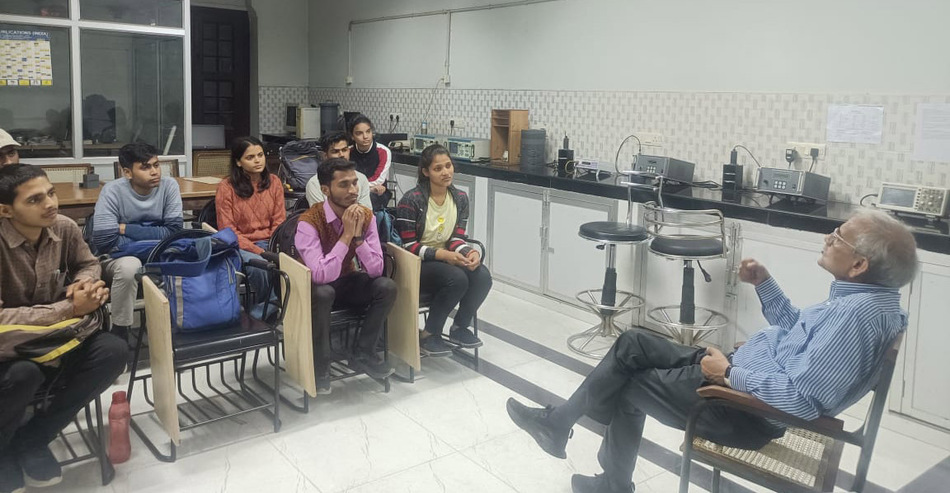 Notre Dame US Fulbright Scholar Umesh Garg (Physics and Astronomy) with students and faculty at BITS-Pilani, Hyderabad
Notre Dame US Fulbright Scholar Umesh Garg (Physics and Astronomy) with students and faculty at BITS-Pilani, HyderabadNDI’s role in the Fulbright application process
Within the prestigious and multi-faceted Fulbright Program, Notre Dame International encourages applications by faculty and liaises with the program on their behalf. Undergraduate students work with the Flatley Center for Undergraduate Scholarly Engagement (CUSE) and graduate students with the Graduate School’s Office of Grants and Fellowships.
“Given NDI’s commitment to sparking and fostering international engagement by the faculty, situating the role of faculty liaison for the Fulbright within our office makes sense strategically,” explains Geraldine Meehan, director of faculty engagement for NDI. “The connections an individual scholar makes during a Fulbright term advance the opportunities available internationally for so many other Notre Dame faculty and students.”
Meehan calls the advantages to any faculty member of winning a Fulbright “immense.” First, the Fulbright funding scheme supports a stipend, travel, accommodation, and an allowance for dependents. “The Fulbright name opens doors. It adds a layer of distinction to a visiting scholar that jumpstarts collaboration for a scholar’s own research agenda and, collectively, advances scholarship on any number of pressing global challenges," she adds.
ND Fulbright U.S. Scholar Jaimie Bleck addresses engagement with democracy in West Africa
With democracy and threats to it undoubtedly one of the world’s most pressing global challenges, the focus of Notre Dame Political Scientist Jaimie Bleck’s Fulbright term was on strategies for engagement with democracy among young people in West Africa. Her host from August 2022 to June 2023 was The Jesuit University - the Center for Research and Action for Peace (CERAP) in Abidjan, Côte d’ Ivoire. There, Bleck taught research methods to masters’ level students and continued her book project on the impact of tea-drinking, social clubs (grinw) and their contribution to social capital and democratic resilience among young people in Mali.
A co-authored article based on that research is forthcoming in the American Political Science Review. With enthusiastic participation from many partners throughout Notre Dame, Bleck’s initial collaboration with CERAP expanded into several spheres.
“I was fortunate that colleagues throughout Notre Dame were incredibly supportive in helping to build on the partnership with CERAP,” she says. “For example, the Institute for Scholarship in the Liberal Arts (ISLA) awarded a research grant to political science graduate student Rasheed Ibrahim which enabled us to conduct collaborative research with the CERAP Vice President and fellow political scientist Fr. Brice Bado on youth attitudes toward foreign powers. Additionally, NDI's Jackie Oluoch-Aridi, director, Nairobi arranged and finalized an MOU with CERAP during my stay."
With that as a start, the matrix of collaborations throughout Notre Dame grew even larger during Bleck’s Fulbright term.
“Ernesto Verdeja, associate professor of peace studies and global politics in the Kroc Institute for International Peace Studies, came to Abidjan to give a talk on his research on disinformation and misinformation,” she explains. “And, Holly Rivers, associate director of the Kellogg Institute for International Studies, and I organized a virtual event on human development with two other universities—the African School of Economics (ASE) and Seeka University—as well as with French-speaking students affiliated with Kellogg.”
She adds that Rivers later visited to scout out potential areas of collaboration with CERAP, ASE, Seeka, and the U.S. Embassy.
Past and future ND Fulbright U.S. Scholars
There have been more than 100 Fulbright U.S. Scholar awardees at Notre Dame—faculty and administrators and across all colleges. The deadline for applications for the Fulbright U.S. Scholar Program is mid-September each year.
Two Notre Dame faculty members were successful in the Fulbright U.S. Scholar application cycle last year:
- Sarah Edmands Martin, assistant professor of visual communication design, will design an interactive digital folktale at Norway’s Univeritetet I Bergen. Learn more about her work.
- Steve Reifenberg, teaching professor of international development in the Keough School, will work with faculty and administrators at the Pontificia Universidad Católica de Chile in Santiago. Learn more about his work.
Meehan recommends that any faculty interested in a Fulbright award discuss possibilities and processes with her along with the appropriate departmental chair or dean’s office. With the essence of the Fulbright program one of scholarly exchange, Meehan also notes that NDI is eager to work with faculty who propose that the University act as a host for an existing or potential international collaborator.
“Visiting Fulbright scholars can enrich Notre Dame’s intellectual and research endeavors,” Meehan point out,” as well as help forge new international connections for our faculty and students. And there is no financial outlay for any specific faculty member, department, or college beyond providing access to facilities and programs. The Fulbright Commission underwrites the entire cost of the scholar’s visit.”
For more information on how to apply to be a Fulbright U.S. Scholar or how to host a scholar at Notre Dame, contact Dr. Geraldine Meehan.
| Notre Dame Faculty who Received Fulbright US Scholar Awards for a duration of 3 months or longer since 2016 | |||
|---|---|---|---|
| FACULTY MEMBER | DEPARTMENT | HOME COUNTRY | AWARD YEAR |
| Umesh Garg | Physics | India | 2022-2023 |
| Jaimie Bleck | Political Science | Ivory Coast | 2022-2023 |
| Ani Aprahamian | Physics | Armenia | 2020-2021 |
| Kevin Roche | Engineering | Spain | 2019-2020 |
| Mark Sanders | English | Ecuador | 2018-2019 |
| Christian Poellabouer | Computer Science | Austria | 2018-2019 |
| Semion Lyandres | History | United Kingdom | 2018-2019 |
| Mary Ellen O'Connell | Law | Norway | 2017-2018 |
| Elizabeth Tuleja | Business | China | 2017-2018 |
| Amy Mulligan | Irish Language & Literature | United Kingdom | 2016-2017 |
Originally published by at international.nd.edu on September 15, 2023.
Latest Research
- Fighting for Better Virus DetectionAn electronic nose developed by Notre Dame researchers is helping sniff out bird flu biomarkers for faster detection and fewer sick birds. Read the story
- Notre Dame’s seventh edition of Race to Revenue culminates in Demo Day, a celebration of student and alumni entrepreneurship…
- Managing director brings interdisciplinary background to Bioengineering & Life Sciences InitiativeThis story is part of a series of features highlighting the managing directors of the University's strategic initiatives. The managing directors are key (senior) staff members who work directly with the…
- Monsoon mechanics: civil engineers look for answers in the Bay of BengalOff the southwestern coast of India, a pool of unusually warm water forms, reaching 100 feet below the surface. Soon after, the air above begins to churn, triggering the summer monsoon season with its life-giving yet sometimes catastrophic rains. To better understand the link between the formation of the warm pool and the monsoon’s onset, five members of the University of Notre Dame’s Environmental Fluid Mechanics Laboratory set sail into the Bay of Bengal aboard the Thomas G. Thompson, a 274-foot vessel for oceanographic research.
- Exoneration Justice Clinic Victory: Jason Hubbell’s 1999 Murder Conviction Is VacatedThis past Friday, September 12, Bartholomew County Circuit Court Judge Kelly S. Benjamin entered an order vacating Exoneration Justice Clinic (EJC) client Jason Hubbell’s 1999 convictions for murder and criminal confinement based on the State of Indiana’s withholding of material exculpatory evidence implicating another man in the murder.
- Notre Dame to host summit on AI, faith and human flourishing, introducing new DELTA frameworkThe Institute for Ethics and the Common Good and the Notre Dame Ethics Initiative will host the Notre Dame Summit on AI, Faith and Human Flourishing on the University’s campus from Monday, Sept. 22 through Thursday, Sept. 25. This event will draw together a dynamic, ecumenical group of educators, faith leaders, technologists, journalists, policymakers and young people who believe in the enduring relevance of Christian ethical thought in a world of powerful AI.








